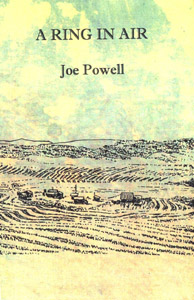A Ring in Air by Joe Powell
Drawings by Cindy Krieble
40 pp., 2003
THE WEASEL
I was crossing the creek’s plank
to fish the other side of the foamy pool,
when he popped up and stood his ground
like some grim gatekeeper of his side of the world.
Brown beady snake-eyes glared through
the wooden shiver of my footprints.
He stood straighter the closer I came.
A slinky brawler, a muscled f.
No “Shoo” or whistle impressed him,
the flex of his mouth set for neither humor nor
wonder,
but the throats of chickens & rabbits,
his
tail as still as a lizard’s.
When I stroked his head
with
the tip of the fishing pole,
scratched the yellow map of Florida under his chin,
I felt the cold rhythm of his heart,
the ice at the end of his gaze.
He didn’t move, even as I flicked
his tail from side to side,
or jousted his belly. He swayed
but arched back into his stiff stare.
What did he see, crossing there?
Some vole-thief with a foot in his field,
some clumsy wizard with a worthless wand?
MABLE’S CAFE
At Mable’s the clock is a green cup
with plastic silver steam
and mocks the time that’s never right.
Old men like these restaurants
with baseball trophies on a shelf,
the bar and swivel stools worn smooth,
pie-slices spinning in a lighted case,
temptations still to be touched.
A cigarette burning in an ashtray
and red half-lips smudged on cups
are forms of faith each day denies.
They read the signs for benefits and horse-shows,
customers-of-the-month taped to the milk machine.
Even dusty antlers on the wall
are stories they remember.
They know where they belong—without a word
eggs are made the way they like them,
coffee cups are never cold.
Waitresses tease and dote like wives did once.
Knobby knuckles are stiff and can’t
curve through cup-handles; they see
a world that’s magnified—not by hope,
desire, the wages of accomplishment,
but glass, ground down and thick
as foreign speech. Bent over steam, small talk,
their old selves come and go
like news of friends who died.
They like waitresses old enough to take a bawdy joke,
call them “honey,” who know
what dreams become, what lies attend them still,
yet laugh, not because they’re paid to,
but they’ve seen enough of pity,
the trembling cups these men drink from.
Their “honey” is a form of grace
modified and blessed by a look
passing across a face.
When a man leaves, he waves a finger in farewell
as if to catch a last minute like a ring in air.
